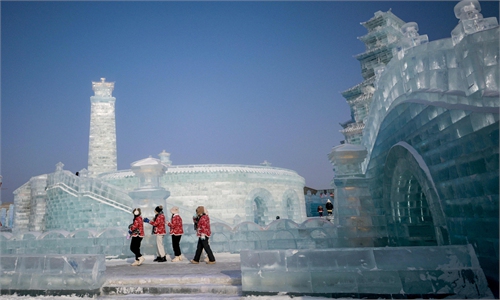ARTS / CULTURE & LEISURE
Tourism boom sparks exchanges of love between north and south
Harbin, Nanning send each other thank-you gifts

Photo: VCG
Eleven preschoolers from South China's Guangxi Zhuang Autonomous Region toured Harbin, Northeast China's Hei-longjiang Province, one of China's hottest tourist spots this winter. Their trip, overloaded with cuteness, has become an online hit. To express gratitude for the great care and hospitality the kids received, Guangxi sent nearly 200 tons of fresh tangerines to Harbin as a thank-you gift. The story continued with Harbin sending back more gifts to Guangxi, which gradually evolves to a "gift" and friendship exchange craze sweeping across the country.Praised by international media as a "winter wonderland," "China's ice city," the city of Harbin attracted a record number of visitors over the New Year's Day holidays. The city's popularity continued after the holiday as the 40th Harbin International Ice and Snow Festival kicked off soon after. Tourists from home and abroad were drawn to the city by its grand and exquisite snow and ice sculptures. Among them, the 11 preschool children from Nanning, the subtropical capital city of Guangxi, over 3,000 kilometers away, were surely one of the highest profile guests.
Aged between 3 and 6 years old and escorted by three teachers, the students were bundled up in bright orange down coats, the same color as the peel of sugar tangerines, during their trip to the north. As the fruit is one of the signature agricultural products of Guangxi, the kids were affectionately given the nickname "little sugar tangerines" by netizens.
Upon their arrival in Harbin, they became an online hit on multiple social media platforms as they happily rolled around in the snow for the first time of their life and visited the local landmark, the Harbin Ice-Snow World. Each detail of the trip was managed so they were kept safe and warm while they had fun. When they returned to Harbin from Mohe, China's northernmost city, they were greeted by local police and presented with souvenirs. According to Harbin Daily, more than 2 million netizens across the nation followed the livestreams of their trip to Heilongjiang.
In a sign of gratitude, a total of 189 tons of freshly picked sugar tangerines from Guangxi were sent to Heilongjiang, and given out at a popular tourist destination for free. Heilongjiang, in return, prepared 100,000 boxes of high-quality cranberries to send to Guangxi.
These cranberries were picked from the city of Fuyuan in Heilongjiang, which again stirred heated online discussions, with many netizens - some even locals from Heilongjiang, commenting that they didn't know Fuyuan grew this fruit.
In addition to several rounds of "gift exchanges," Guangxi announced it will offer free or low-priced admission to tourists from Heilongjiang at some local tourist spots. Videos of buses in Nanning decorated with traditional designs of northeastern regions and featuring the slogan "Welcome to Harbin" also went viral online.
"These two cities are so far away from each other, one in the north while the other is in the south. How did you two suddenly form such a close bond with each other?" commented a netizen jokingly.
Apart from exchanging specialties and promoting tourism, cultural exchanges between the north and south are also heating up. On Monday, the Harbin Normal University Affiliated Primary School was bustling with activities. The school welcomed a delegation from the Nanning City Bureau of Culture, Radio, Television and Tourism, along with artists from the Nanning Art Theatre. Together, they enjoyed a series of lively performances. Children from the Zhuang ethnic group from Guangxi dressed in traditional ethnic clothing exchanged gifts with students in Harbin. They gave embroidered balls, a traditional handcraft of the ethnic group, to their peers in Harbin in the hopes of bringing them happiness. In return, they received traditional paper cutting artworks made by students from Harbin.
More and more regions joined in the exchanges between the north and south. Zhang Yiwu, a professor at the Peking University, told the Global Times that the wave of exchanges brought by the tourism boom in Harbin was a good sign and very encouraging.
"This will not only inject more vitality into China's domestic tourism, it also deepens the exchanges and understanding between different regions of the country. As we can see, China's land is vast and has abundant resources, as well as rich cultures. Now people are gradually coming to realize that there's so much to see and explore within the country. It strengthens our sense of belonging and confidence in our culture," added Zhang.



